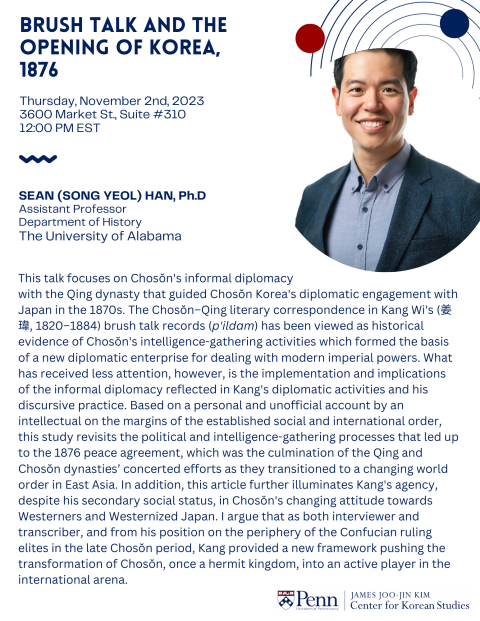
Korean Studies Colloquium
3600 Market Street, Suite 310 Philadelphia, PA 19104
This talk focuses on Chosŏn's informal diplomacy with the Qing dynasty that guided Chosŏn Korea's diplomatic engagement with Japan in the 1870s. The Chosŏn–Qing literary correspondence in Kang Wi's (姜瑋, 1820–1884) brush talk records (p'ildam) has been viewed as historical evidence of Chosŏn's intelligence-gathering activities which formed the basis of a new diplomatic enterprise for dealing with modern imperial powers. What has received less attention, however, is the implementation and implications of the informal diplomacy reflected in Kang's diplomatic activities and his discursive practice. Based on a personal and unofficial account by an intellectual on the margins of the established social and international order, this study revisits the political and intelligence-gathering processes that led up to the 1876 peace agreement, which was the culmination of the Qing and Chosŏn dynasties’ concerted efforts as they transitioned to a changing world order in East Asia. In addition, this article further illuminates Kang's agency, despite his secondary social status, in Chosŏn's changing attitude towards Westerners and Westernized Japan. I argue that as both interviewer and transcriber, and from his position on the periphery of the Confucian ruling elites in the late Chosŏn period, Kang provided a new framework pushing the transformation of Chosŏn, once a hermit kingdom, into an active player in the international arena.
Dr. Sean (Song Yeol) Han is an assistant professor of Asian history at the University of Alabama. His book project, Underdogs Scriptosphere: Sinographic Network and Korean Nationhood, 1860-1945, rewrites the culture and diplomacy in East Asia at the turn of the twentieth century. Han looks into the transnational flow of geopolitical, literary, and historical knowledges between China and Korea, and intra-Asian discourses and the self-images created by intellectuals and nationalist ideologues who explicitly intended to subvert Euro-American (and Japanese) imperialist versions of global modernity. Dr. Han earned his Ph.D. from Princeton University and B.A. from Seoul National University. He is the associate director of the Chosŏn History Society—a public learned society promoting the study, research, and teaching of Korea's past.
 James Joo-Jin Kim Center for Korean Studies
James Joo-Jin Kim Center for Korean Studies